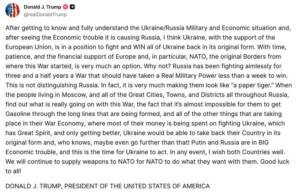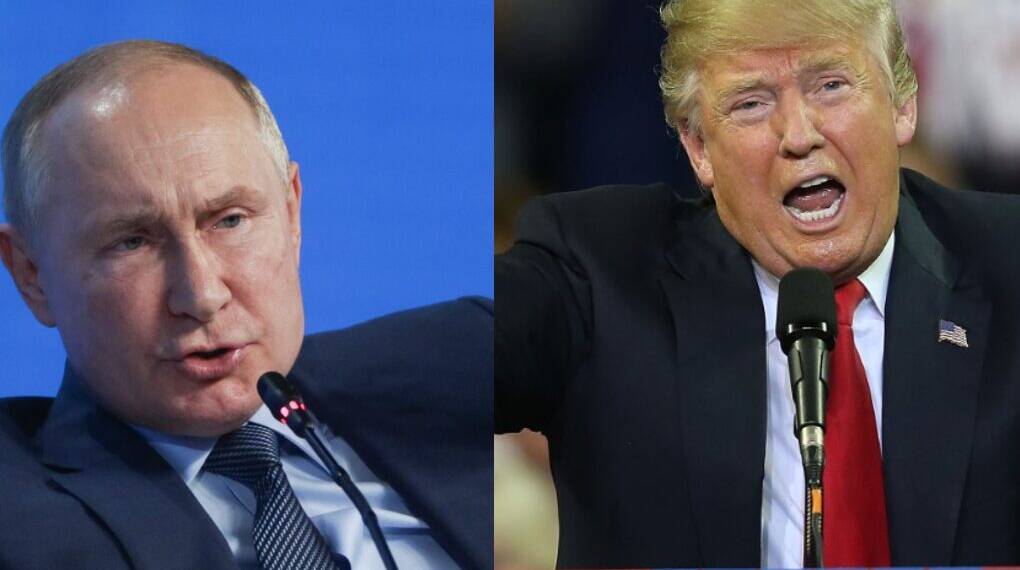In a dramatic shift that stunned global diplomats, U.S. President Donald Trump declared on Tuesday that Ukraine can win back all of its lost territory from Russia — including Crimea — while calling Moscow a “paper tiger.” The statement, delivered during his address to the United Nations General Assembly, marks a sharp departure from Trump’s long-held stance that the war should be settled through negotiations and territorial concessions.
Adding fuel to the fire, Trump went on to endorse the idea that NATO countries should shoot down Russian aircraft if they violate alliance airspace. The remarks, unprecedented for the former skeptic of NATO, have raised fears that the war in Ukraine could spill into a direct NATO-Russia confrontation — a scenario many warn could trigger a wider global conflict reminiscent of the world wars of the 20th century.
Trump’s U-Turn on Ukraine

During his first term and much of his 2024 campaign, Trump criticized U.S. spending on Ukraine and called NATO “obsolete.” He frequently argued that Kyiv would need to surrender land to secure peace.
But after a closed-door meeting with Ukrainian President Volodymyr Zelenskyy on the sidelines of the UNGA, Trump struck a new tone. “I really do feel that way. Let them get their land back,” he told reporters. On his social media platform, Truth Social, Trump wrote that Ukraine, with European and NATO backing, “can win all of its land back and restore pre-2022 borders.”
He added that Russia, despite three and a half years of war, “looks like a paper tiger” that has failed to achieve a quick victory and is now “in big economic trouble.”
A Dangerous Escalation
While Trump stopped short of promising direct U.S. military involvement, his comments about NATO countries shooting down Russian aircraft mark a significant escalation. Until now, NATO has avoided direct military action against Russia, fearing a spiral into full-scale war.
“Mr. President, do you think NATO countries should shoot down Russian aircraft if they enter their airspace?” a reporter asked. Trump’s response was blunt: “Yes, I do.”
Analysts warn this could encourage Poland, the Baltic states, or Romania to take preemptive action against Russian jets near their borders — a red line that Moscow has repeatedly said would trigger retaliation.
Fears of a New Global Divide
Trump’s words come as the Ukraine war drags into its fourth year, with Russia pushing slow but steady advances in the east. Many observers now fear the conflict could widen, splitting the world into two rival camps.
On one side, the NATO bloc: the United States, Canada, European allies, and partners like Japan, South Korea, and Australia — nations with immense economic and military power.
On the other hand, a loose coalition often dubbed the “Axis of Upheaval”: Russia, China, Iran, and North Korea, supported by Venezuela, Syria, and others who share anti-Western grievances. Together, they bring manpower, resources, and regional leverage, even if they lack NATO’s technological edge.
The echoes of past world wars are difficult to ignore.
The Nuclear Shadow
Any potential NATO-Russia confrontation carries a terrifying nuclear dimension. Russia’s military doctrine allows the use of tactical nuclear weapons in response to perceived existential threats. With over 12,000 nuclear warheads globally — half held by Washington and Moscow — even a limited exchange could have catastrophic consequences.
“Trump’s words might rally NATO, but they also corner Putin,” said one European diplomat. “And a cornered nuclear power is the most dangerous of all.”
India’s Dilemma
For India, the crisis presents an impossible choice. As the world’s largest democracy and a member of the Quad alongside the U.S., Japan, and Australia, New Delhi’s values and partnerships tilt toward the West.
Yet its long-standing ties to Moscow cannot be ignored. Russia remains India’s biggest defense supplier, and discounted Russian oil has cushioned the Indian economy. A NATO-Russia war could force India to choose — risking either alienation from Moscow or sanctions from the West.
“India’s balancing act is sustainable only if the war ends soon,” noted one South Asia analyst.
Calls for Restraint
Despite the fiery rhetoric, some observers believe Trump may still use his trademark dealmaking approach to force negotiations. Zelenskyy, for his part, called for more sanctions on Russia and urged European nations to stop buying Russian energy.
At the UN, however, European officials privately expressed concern that Trump’s pivot could derail fragile peace efforts. “Is he ditching diplomacy entirely?” one EU diplomat asked. “Or is this simply another bargaining tactic?”
What next ?
Trump’s pivot has electrified Ukraine, alarmed Russia, and unsettled NATO allies. With tensions already high and frontlines hardening, his words may accelerate the march toward direct confrontation — or they may serve as a dramatic opening move to push both sides back to the negotiating table.
For now, the world watches nervously. History shows how quickly regional wars can spiral into global ones. The difference today? The nuclear shadow looming over every decision.
Whether Trump’s speech marks the first spark of World War III or the bold gamble of a dealmaker remains to be seen.








